by Naomi L. | November 8, 2017 | Blog, Creative Writing |
So you’ve made it through the first week of NaNoWriMo! How’s that novel coming along? Whether you’re a veteran or this is your first NaNoWriMo ever, chances are you’re already starting to feel a little doubt creeping in. Maybe you’ve fallen behind on your goal, or maybe you’re beginning to feel the burnout from all that writing. But the moment your energy falters is when you expose yourself to the poisonous idea that maybe you’re not a real writer after all. Don’t give in to that thought!
So to keep you motivated through at least the next week of NaNoWriMo, here are ten signs that you are a real writer. Remind yourself of some (or all) of these truths every day and know that you can do this! Good luck!
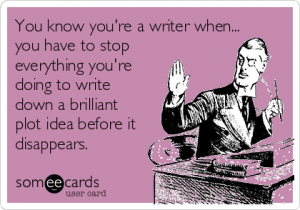 1) Telling stories is one of your best and favorite skills. – Nothing says “I’m a writer” like the gift of telling stories. If your friends and family often read your work and ask you to tell them a tale every time you hang out, you know you’re on the right track!
1) Telling stories is one of your best and favorite skills. – Nothing says “I’m a writer” like the gift of telling stories. If your friends and family often read your work and ask you to tell them a tale every time you hang out, you know you’re on the right track!
2) You’d rather spend time in your fictional worlds than your real one. – Where would you rather celebrate the holidays: the office Christmas party or the Yule Ball at Hogwarts? That’s what I thought.
3) The conversations you have with the voices in your head are way more interesting than the ones you have with real people. – Who wants to waste time on small talk when you could be discussing dragons or planning how to stop that alien invasion? The characters in your head will always have something more interesting to contribute to the conversation!
4) You carry a notebook with you everywhere you go. – Inspiration strikes when you least expect it. You gotta be ready to capture those ideas when they come to you!
5) You can find the tiniest flaws in your favorite novels. – Thinking like a writer means reading like a writer. Because you understand the craft, you can read any book and spot the smallest errors from continuity to misused words that most readers can’t. It’s kind of like having a superpower, isn’t it?
6) You never stop brainstorming story ideas. Ever. – You could be in the middle of an important business meeting, out to lunch with friends, or spending the holiday with family, but your creative mind will never shut off completely. Story ideas are everywhere! How could you possibly stop thinking about them?
7) You’re pretty sure your blood is 90% coffee. – How else are you supposed to power through those late-night writing sessions?
8) You’re a master of procrastination. – Sure, everyone procrastinates, but nobody can perfect the art quite like writers can. Writing is hard, ok? Sometimes we need a break to read or snack or play video games. Just five more minutes, I swear!
9) But once you get into that writing groove, you couldn’t stop if a meteor hit you! – Writing time is sacred. You know you’re a writer when even your family and/or significant other know not to disturb you when you’re in the zone. Bonus points if it’s because they know they’ll be punished if they do!
10) Writing is your life! – You love to write! You’ve already committed to writing a novel, haven’t you? What other proof do you need that you’re a real writer?
Have you ever doubted yourself or your writing skills? How do you handle those slips in self-confidence?
by Naomi L. | November 1, 2017 | Blog, Creative Writing |
Welcome to November, otherwise known to writers as National Novel Writing Month! It’s time once again to shift your writing into high gear by writing a 50,000-word novel in 30 days! Of course, it’s not so easy to take on this challenge without a fair amount of motivation to get you going, and one of my favorite sources of writing inspiration is collections of quotes by well-established writers. Over the past two years, I’ve started November by sharing NaNoWriMo motivation in the form of ten writing quotes from famous authors. Now let’s dive into another set of quotes for inspiration!
So to get you motivated for NaNoWriMo 2017, here are another ten inspirational quotes about writing from famous storytellers. Enjoy, and good luck in this year’s NaNoWriMo!

1) If you want to be a writer, you must do two things above all others: read a lot and write a lot. – Stephen King
2) Stories may well be lies, but they are good lies that say true things, and which can sometimes pay the rent. – Neil Gaiman
3) After nourishment, shelter and companionship, stories are the thing we need most in the world. – Philip Pullman
4) All you have to do is write one true sentence. Write the truest sentence that you know. – Ernest Hemingway
5) A word after a word after a word is power. – Margaret Atwood
6) There is something delicious about writing the first words of a story. You never quite know where they’ll take you. – Beatrix Potter
7) A writer is someone for whom writing is more difficult than it is for other people. ― Thomas Mann, Essays of Three Decades
8) I write to give myself strength. I write to be the characters that I am not. I write to explore all the things I’m afraid of. – Joss Whedon
9) You can make anything by writing. – C.S. Lewis
10) Write the kind of story you would like to read. People will give you all sorts of advice about writing, but if you are not writing something you like, no one else will like it either. – Meg Cabot
What are your thoughts on these writing quotes? Any others you’d add to the list for NaNoWriMo?
by Naomi L. | October 25, 2017 | Blog, Creative Writing |
With Halloween just around the corner, it’s a great time to binge watch scary movies and practice writing horror stories. And the scariest part of a horror story—as well as one of the scariest parts of most stories in general—is usually the antagonist, the villain who embodies the evil of the plot and serves as the main barrier between the hero and victory.
But antagonists can also be the most challenging characters to write. Not only do you need to make them just as interesting as your protagonists in order to carry the story, but you often have to do it in fewer words, as villains usually get less focus and have limited room for character development. Not every writer can pull this off well, but fortunately, there are a few writing tips you can use to turn your villains from flat and boring to fascinating and terrifying.
So in the spirit of Halloween and scary characters, here are three writing tips to help you create villains who are just as interesting as your heroes. Enjoy!
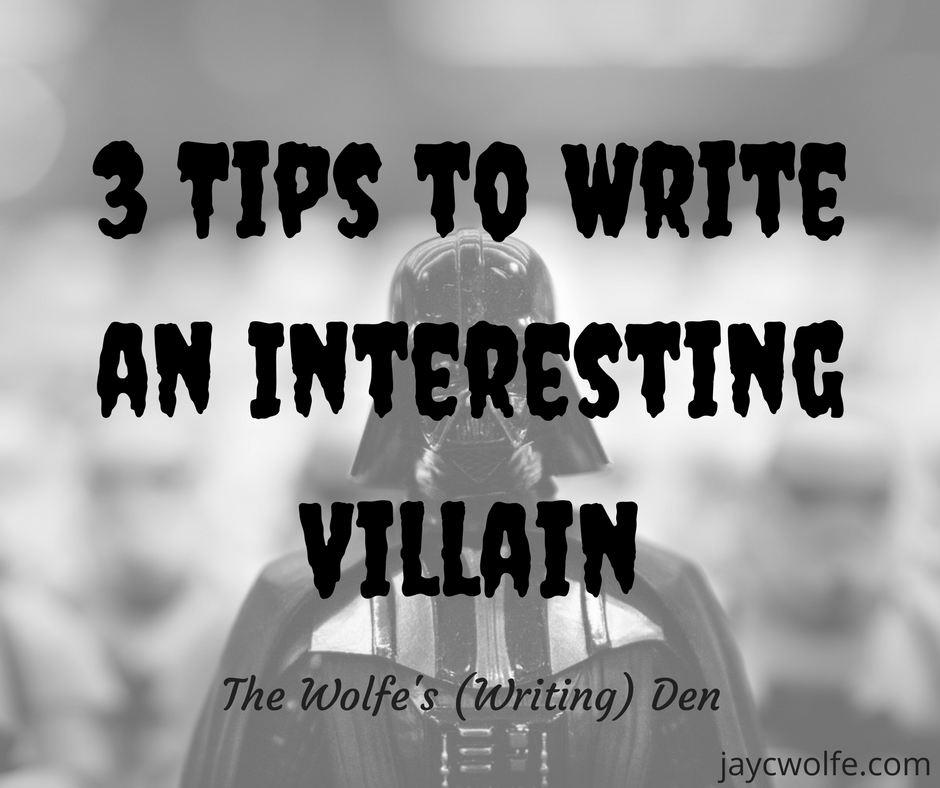
1) Villains should be just as three-dimensional as their heroic counterparts.
I’m bad, and that’s good. I will never be good and that’s not bad. There’s no one I’d rather be than me. – Bad-Anon closing affirmation, Wreck-It Ralph (2012)
Have you ever read a book or watched a movie that starred a kickass hero, but for some reason they never seemed to reach the peak of their awesomeness? Chances are what could have been a great story arc fell flat because of a terribly written villain.
We know that part of telling a good story is creating good characters, but many writers tend to focus all that character-building attention on their protagonists and not enough on their antagonists. (Don’t feel bad if you can relate; I’ve definitely been guilty of this myself.) I’m sure at some point, we’ve all fallen into the trap of making an antagonist “just a bad guy”, but it’s important to remember that villains are people too—well, in the broader sense of “sentient beings”—and much like real people, all characters should be three-dimensional. No exceptions.
Personally, I hate it when a villain has literally zero depth. It may seem like a good idea on the surface to make a bad guy as bad as possible, but no one is purely evil for the sake of being evil, any more than a hero is good just because the story calls for it. If we take exceptional care to give our protagonists clear dreams, goals, strengths, and weaknesses, we should do the same for our antagonists. A hero is only as good as their villain, right?
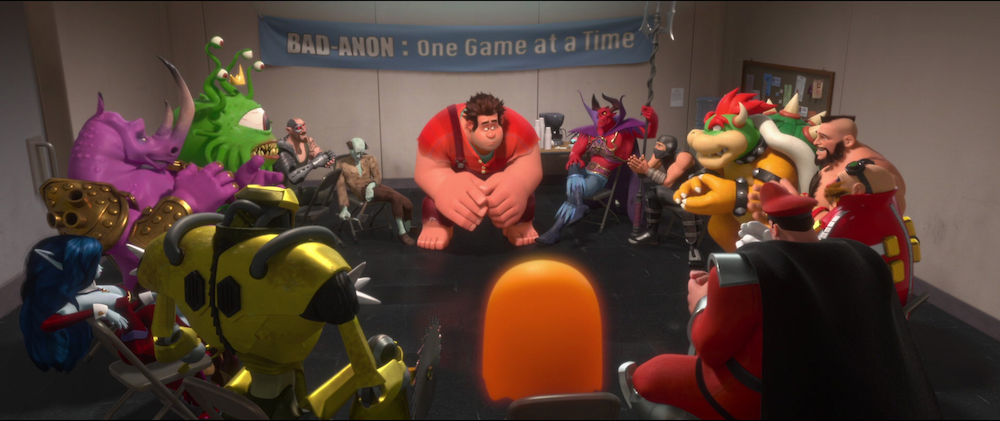
The Bad-Anon support group for video game villains (Wreck-It Ralph, 2012)
One of my favorite modern examples of how much depth a villain can have is the 2012 Disney movie Wreck-It Ralph. Given how everyone treats him like a monster and almost no one respects him, Ralph is a good example of a character who was forced into the role of a villain despite not actually deserving it. Of course, after leaving his game and setting out on his own adventure, he does prove to everyone that he’s much more than a “bad guy” in the end. While the movie isn’t about a “villain” per se, Wreck-It Ralph does teach two important lessons about antagonists:
- Villains and conflict are indispensable to storytelling (and therefore must be respected) – Fix-It Felix Jr. is no longer playable without “the bad guy who wrecks the building”
- No one is the villain of their own story – despite being the bad guy of Fix-It Felix Jr., Ralph is clearly the hero of his own adventure
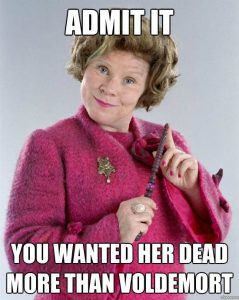 In contrast, my least favorite antagonists are usually the ones whose only defining characteristic is “being evil”. You know who I’m talking about: those one-dimensional a-holes with zero redeeming qualities who can make you fume or gag every time they appear on page or screen, like:
In contrast, my least favorite antagonists are usually the ones whose only defining characteristic is “being evil”. You know who I’m talking about: those one-dimensional a-holes with zero redeeming qualities who can make you fume or gag every time they appear on page or screen, like:
It’s one thing to give your character less-than-noble motives; it’s another to go out of your way to make the audience hate them. But then again, even “pure evil” can be interesting when written well (case in point: the villains listed above are all bad people, but not necessarily bad characters). It all comes down to a delicate balance between characterization and storytelling.
So when writing your antagonist, always make sure you give them as much background and attention to detail as you give your heroes. Remember that a good villain has depth and personality, not just “evil plans”. Bonus points if you can make your audience sympathize with the bad guy. After all, hero or villain, we’re all still people. Which brings me to the next point…
2) Nobody starts out as a bad guy, not even villains.
You either die a hero, or you live long enough to see yourself become the villain. – Harvey Dent/Two-Face, The Dark Knight (2008)
Although it’s easy to think of the world in terms of good and evil, the fact is that all people start out as blank slates. Every individual has a story to tell, a history behind the person they become. It’s the circumstances of one’s story—and the choices they make in response to those circumstances—that determine if they become a hero or a villain (or neither). In a nutshell, bad guys aren’t born, but made.
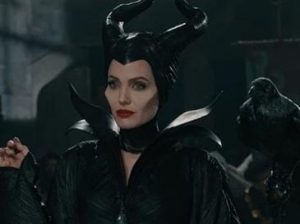
Maleficent crashes Princess Aurora’s christening (Maleficent, 2014)
A well-known modern example of the making of a villain is Disney’s 2014 Sleeping Beauty retelling, Maleficent. While the 1959 animated movie portrayed this character as little more than a vindictive witch (who seriously could not let go of a grudge), this version of the story digs a little deeper into how the fairy Maleficent became malicious enough to curse an innocent child. Between the beginning of the film and Aurora’s christening, we learn that Maleficent started out kind and idealistic, but her relationship with Stefan turned her bitter and vindictive against humankind. Say what you will about the film’s execution, but at least it establishes a clear backstory and motive for a character who would otherwise be just another run-of-the-mill fairytale villain.
If you feel your antagonist is missing clear motivation for their actions, try giving them a backstory that explains how they became evil. You don’t have to expose their entire life story to the audience, but at least convince us of their reasons for opposing the heroes. Show us what broke them so badly that it turned them to the dark side. Remember, the only people who start out as bad guys are cartoon villains; everyone else has a story.
3) An interesting villain is just as strong, smart, and capable as the hero (if not more).
A census taker once tried to test me. I ate his liver with some fava beans and a nice Chianti. – Hannibal Lecter, The Silence of the Lambs (1991)
Take a second to think about your favorite villains in any books, movies, or TV shows. What do they all have in common (aside from the fact that they’re doing bad things to good people)? Why do you find them so fascinating? Because they’re good at what they do!
The most interesting and popular villains are usually those who challenge the heroes, and it’s obviously not by being total pushovers. Darth Vader mercilessly kills any subordinate who disappoints him and pushes Luke Skywalker to his limit in their first lightsaber duel. Before his downfall, Voldemort was so terrifying that witches and wizards everywhere were afraid to say his name. A large part of what makes Hannibal Lecter so fascinating and frightening is how mysterious and complex he is. Basically, if an antagonist can draw your full attention and steal every scene they’re in, you know they can give the heroes a run for their money!
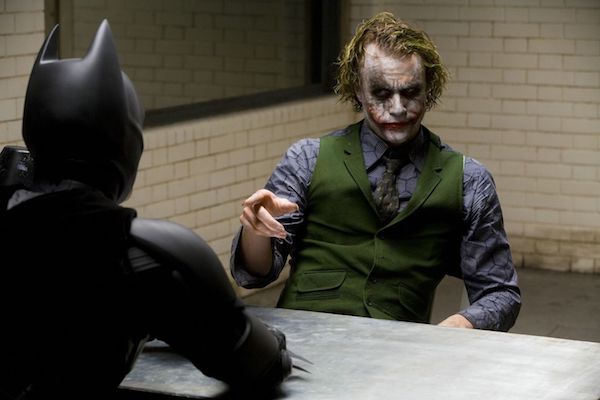
The Joker being interrogated by Batman (The Dark Knight, 2008)
One of the most popular examples of a brilliant and highly capable villain is the Joker from The Dark Knight. Aside from his unpredictability, a major reason the Joker is so interesting is that he’s one of the few villains who actually challenges Batman. Like the embodiment of chaos itself, he keeps the hero and the entire police force of Gotham guessing and thwarts them so many times that we as the audience can’t help but wonder what he’s going to do next at every turn. Now that’s a well-written villain!
So keep in mind, if you find your heroes aren’t reaching their full potential, the problem might be with your villains. Superpowers and high intelligence aren’t enough to make a great hero; you have to give them someone or something to use those abilities against. Make your antagonists just as strong and smart as the protagonists, then have them push each other to their limits. Only by overcoming a nearly insurmountable obstacle will your hero’s story arc be as satisfying and captivating as it deserves. In more ways than one, an antagonist can make or break your story!
Do you struggle with writing antagonists? What are your thoughts on these tips for writing an interesting villain? What other tips would you add to this list?
by Naomi L. | October 4, 2017 | Blog, Creative Writing |
It’s the first week of October, so regular readers of mine, you know the drill: it’s time to dive once again into my all-time favorite story, Romeo & Juliet! In the past, I’ve covered five points in the story that are often missed, the reasons it really is a great love story, a review of the book with both the play and the musical adaptation, and five lessons about love that can be learned from this story. Now I’m ready to cover even more of this timeless classic!
This year, I decided to dig a little deeper into the story and dedicate my annual R&J post to the literary devices that uphold it. So on that note, here are five major themes and motifs in Shakespeare’s Romeo & Juliet. Enjoy!
1) The Power of Love
But my true love is grown to such excess / I cannot sum up sum of half my wealth. – Juliet Capulet (2.6.33–34)
This one is kind of a given, but it’s such a prominent theme in Romeo & Juliet that it forever warrants a place at the top of the list. Though debates reign about the extent of the roles of fate, hatred, and violence in the play, it’s obvious that love is by far the most powerful force in this story. It brings the young lovers together, motivates them to risk everything to be together, and drives them to their tragic end. So let’s explore how powerful love really is in Romeo & Juliet, shall we?
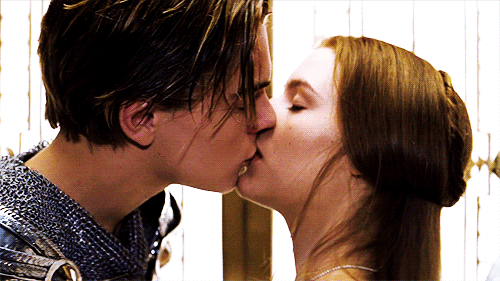
“Then have my lips the sin that they have took.” (1.5.110)
Romeo and Juliet share their first kiss (Romeo + Juliet, 1996)
To start, it’s important to define the type of love that dominates the play. There’s no question that the love in Romeo & Juliet is romantic, but what often gets overlooked is the fact that it’s also amoral. While other poets before him romanticized love as a beautiful and pure emotion, Shakespeare was more interested in portraying it as an intense and violent force that drives people into chaos and overpowers all other priorities, including life itself.
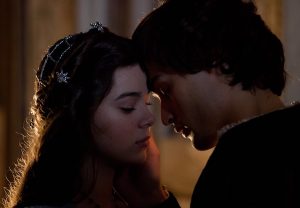
“You kiss by th’ book.” (1.5.112)
Romeo and Juliet find a moment of privacy at the Capulet Ball (Romeo & Juliet, 2013)
The greatest evidence of love’s intensity in Romeo & Juliet is the wide variety of descriptions and metaphors it receives throughout the play. In the sonnet that makes up Romeo and Juliet’s first conversation, love is described in religious terms, while in the prologue of Act II, the feeling is equated to magic. Its dangers are also mentioned by other characters: Friar Laurence warns Romeo about the fickleness of young love, while Mercutio’s Queen Mab speech outright criticizes the delusions of lovers’ dreams. Juliet even loves Romeo so much that she hardly has enough words to express her feelings all at once. Every character in the play seems to have an opinion on love, yet not one of them manages to describe it completely. It seems love, at least according to Shakespeare, is so powerful that it can’t be contained in any one definition.
Though the love in Romeo & Juliet is romantic, it’s far from idealized. Unlike the cheesy version in the bad poetry Romeo recites about Rosaline, Shakespeare’s depiction of love is a far more passionate and chaotic emotion that can evoke an astonishing amount of beauty and tragedy in a short period of time. No wonder this story is still so popular today; every time I read it, there’s something new to learn about love!
2) The Inevitability of Fate
A greater power than we can contradict / Hath thwarted our intents. – Friar Laurence (5.3.153–54)
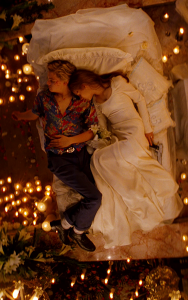
The star-crossed lovers meet their untimely end (Romeo + Juliet, 1996)
If love is the strongest theme in Romeo & Juliet, fate is a close second. From the opening lines of the chorus, it’s made clear to the audience that the young lovers are pretty much doomed from the start. While there is a solid argument that society is really to blame for Romeo and Juliet’s deaths, the fact that Shakespeare peppered his play with references to fate, fortune, and the stars hints at the idea that every circumstance leading up to the main characters’ tragic end was always out of their control.
Notably, the role of fate in this story isn’t just clear to the audience; it’s also evident to the characters themselves. Through the second half of the play, after Mercutio and Tybalt are killed, death always seems to linger in the corner of the lovers’ minds. They’re both haunted by omens—such as each other’s pale faces after spending the night together or Juliet’s vision of Tybalt’s ghost before taking the sleeping potion—and though they try to stave off the looming threat of tragedy, it soon becomes clear that their story can only end in their untimely deaths.
The inevitability of fate is emphasized by the many forms it takes throughout the play:
- The feud between the Capulets and Montagues, which is purposely never explained
- References to fate by the characters – “O, I am fortune’s fool!” (3.1.141), “Then I defy you, stars.” (5.1.24)
- Friar Laurence’s letter failing to reach Romeo
- Romeo dying just before Juliet wakes up
While fate often seems like an external and impersonal divine force driving the characters’ lives, it also manifests as the direct forces influencing Romeo and Juliet’s choices. The rivalry between the noble households culminates in the double murder that complicates the lovers’ marriage, and Capulet’s decision to change the day of the wedding contributes to the rush of events that leads to the final tragedy. Even the protagonists themselves play directly into the hands of fate. The irony of Romeo’s decision to die alongside Juliet is that by trying to defy fate, he inadvertently brings it about: Juliet kills herself as soon as she finds him dead, thus completing the tragic sequence of events set in motion from the play’s very first scene.
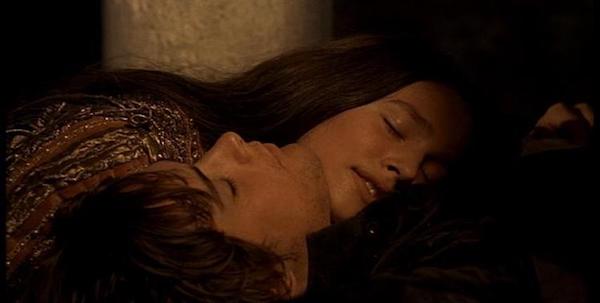
Juliet stabs herself with Romeo’s dagger and dies by his side (Romeo and Juliet, 1968)
Much like love, fate in Romeo & Juliet is an amoral and overpowering force that none of the characters can resist. Despite all their efforts to love each other in peace, Romeo and Juliet can never escape their tragic destiny as the “pair of star-crossed lovers” who “take their life”, immortalizing them as the ill-fated couple of one of the greatest love stories ever told.
3) The Duality of Passion (Love and Violence)
If the entire story of Romeo & Juliet could be summed up in one word, that word would be passion. Almost every scene in the play involves characters succumbing to powerful emotions that drive their actions and, consequently, the plot. Observe:
-
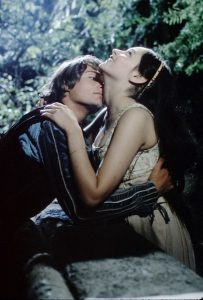
“My bounty is as boundless as the sea, / My love as deep; the more I give to thee, / The more I have, for both are infinite.” (2.2.133–35)
Act I: Montague and Capulet servants fight each other in the street (establishing the long-standing feud), Romeo agrees to attend the Capulet ball for the chance to see a girl he thinks he loves, Romeo and Juliet meet and fall in love at first sight
- Act II: Romeo risks death by trespassing into the Capulet orchard to see Juliet again, Romeo and Juliet declare their love for each other, Romeo proposes to Juliet the next day (via the Nurse), Romeo and Juliet get married
- Act III: Tybalt challenges Romeo to a duel for crashing the Capulet ball, Mercutio fights Tybalt to defend Romeo’s honor, Tybalt kills Mercutio, Romeo fights and kills Tybalt to avenge Mercutio, Romeo almost kills himself out of guilt, Romeo spends the night with Juliet, Capulet threatens to disown Juliet if she doesn’t marry Paris in two days
- Act IV: Juliet threatens to kill herself if Friar Laurence can’t help her get out of marrying Paris, Capulet gets so excited about Juliet becoming obedient that he moves the wedding up to tomorrow, Juliet drinks the sleeping potion Friar Laurence gives her to fake her death
- Act V: Romeo buys poison to kill himself after hearing that Juliet has died, Paris blocks Romeo from entering the Capulet tomb upon assuming he’s there to vandalize Juliet and Tybalt’s bodies, Romeo kills Paris outside the Capulet tomb, Romeo drinks the poison and dies beside Juliet, Juliet wakes up and stabs herself with Romeo’s dagger, Montague and Capulet reconcile over their children’s deaths
Notice how virtually every important action in this play is caused by some intense emotion, whether it’s overpowering love or violent hatred. What’s especially intriguing about the passion in Romeo & Juliet is that love and violence, however polar they may seem, are constantly intertwined. Indeed, the shadow of death hangs over the play’s characters from the prologue to the final scene, and it always manifests as a consequence of passion, as much in love as in hate.
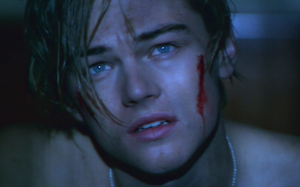
“Ha, banishment? Be merciful, say death.” (3.3.12)
The connection between love and violence in Romeo & Juliet is most evident in the actions and thoughts of the lovers themselves. Both Romeo and Juliet threaten to kill themselves at the first obstacle to their love, each one imagines the other looking dead the morning after their wedding night, and their intensely passionate “star-crossed love” culminates in their double suicide. While their goal is always to keep their love pure, the fact that they both resort to violence to achieve that end supports the story’s major theme of passion as a powerful and blinding force that few can resist.
By all accounts, passion seems to be the cause of all the conflict and grief in Romeo & Juliet. Then again, without passion, there would be no story in the first place, would there?
4) Light and Darkness
More light and light, more dark and dark our woes. – Romeo Montague (3.5.36)
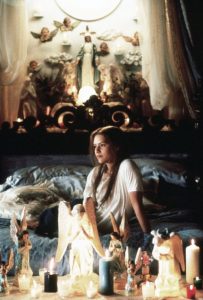
“Gallop apace, you fiery-footed steeds” (3.2.1)
A particularly prominent motif in Romeo & Juliet is the imagery of light and darkness. This motif manifests most frequently in night and day, as much of the action in the play happens either at night or in the morning. And while it doesn’t necessarily highlight any moral statement, the light and dark imagery of Romeo & Juliet does provide an interesting contrast throughout the story.
The most famous example of this imagery is during the balcony scene when Romeo describes Juliet as the sun, being so beautiful and radiant that she has the power to turn night into day. Another well-known example of this contrast is the morning after their wedding night, when the lovers playfully argue about the time of day before Romeo leaves for Mantua. These scenes highlight differing perspectives of the world and emphasize how Romeo and Juliet seek refuge in their love to oppose the reality that threatens to separate them.

“Wilt thou be gone? It is not yet near day.” (3.5.1)
Unlike many other stories that use this motif to symbolize good and evil, the light and darkness in Romeo & Juliet are far more neutral. The lovers favor darkness because it gives them the privacy they desire, yet they see only light in each other. And although it never plays a direct role in their story, the contrast of light and dark does permeate the play until it culminates in a final poetic union: the darkness of Romeo and Juliet’s deaths and the light of hope in their families’ reconciliation.
5) Individuality vs. Social Conformity
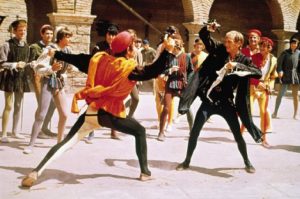
“Alla stoccata carries it away.” (3.1.77)
While love and fate pull most of the strings in Romeo & Juliet, the lives of the main characters are further complicated by the obstacles imposed by their society. Throughout the story, Romeo and Juliet struggle (with varying degrees of success) to defy the social institutions that oppose their love, such as:
- Family and patriarchy
- Religion
- Law and social order
- Masculine honor
Yet despite the challenges they face, the young lovers repeatedly prove that their love is stronger than the social norms that threaten to keep them apart. Juliet defies her father’s authority in order to marry the man she loves and remain loyal to him to the end. Romeo compares Juliet to the sun and considers her more beautiful than the goddess of the moon, while Juliet refers to Romeo as the “god of my idolatry” (2.2.114). While still banished, Romeo returns to Verona to see Juliet one last time before he dies. Romeo refuses Tybalt’s challenge for Juliet’s sake (though he later succumbs to the pressure of honor after Mercutio is killed).
By constantly rebelling against their world, Romeo and Juliet establish themselves as individuals who seek to distance themselves from the obligations their public social lives impose upon them. Yet despite their best efforts to rebel through individuality, these social institutions continue to force them further into a corner until they’re left with only one option for escape. If anything, the greatest tragedy of Romeo & Juliet is that as powerful and beautiful as their love is, they can only find peace from their poisonous society through the ultimate form of darkness and privacy: an eternity together in death.
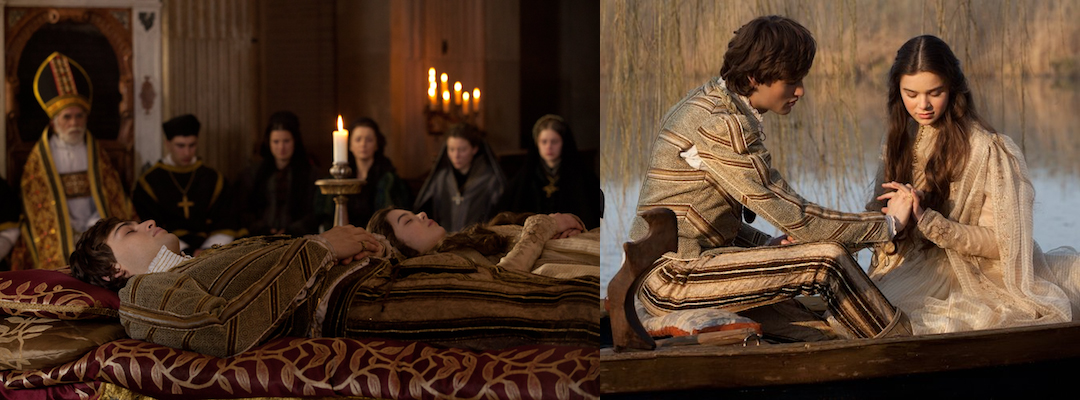
“For never was a story of more woe, / Than this of Juliet and her Romeo.” (5.3.309–10)
What are your thoughts on these themes and motifs in Romeo & Juliet? Any other interesting themes you would add to this list?
by Naomi L. | September 27, 2017 | Blog, Creative Writing |
Writers need a lot of support to make it through their careers. For many of us just starting out, the bulk of that support comes from family, and of all the relatives who motivate you, few do it better than your mom. Given that she’ll always love you no matter what, you know she’s been there for you since the beginning of your life, and she’ll always be there for you to the end!
This week marks a special occasion for that amazing woman in my life, so today I want to honor her with a creative writing post highlighting all the awesome ways she’s supported my dream to be a writer. For your consideration, here are ten signs your mom is the biggest supporter of your writing career. Thanks for all your support, Mom!
 1) She gave you the book that made you want to become a writer in the first place – In my case, that was Charlie and the Chocolate Factory, a book my mom had read as a child and recommended to me when I was nine years old. It changed my life!
1) She gave you the book that made you want to become a writer in the first place – In my case, that was Charlie and the Chocolate Factory, a book my mom had read as a child and recommended to me when I was nine years old. It changed my life!
2) She’s bought you dozens of books throughout your life – From a Roald Dahl collection to the Harry Potter series to The Mists of Avalon, much of my writing has been inspired by books my mom gave me when I was growing up. If your mom gave you plenty of books when you were a kid, you’ll likely find traces of those in your writing too!
3) She didn’t laugh when you told her you wanted to grow up to be an author – If anything, she encouraged your dream and promised to read every single one of your books (which of course you promised to give her free copies of). Bonus points if she bought you the books and/or courses on writing that helped you get there.
4) She brags to everyone she knows that her daughter/son is a writer – Maybe this embarrasses you a little, since most writers prefer to keep to themselves, but hey, free marketing is always a plus!
5) She’s always the first to read your stories – And she loves every single one. Seriously, you could probably write the goriest thriller ever and your mom would still tell you she enjoyed it (though it might be safe to assume she at least skipped over some parts).
6) She’s always the first to review your books – And it’s always five stars across the board. You couldn’t ask for a more devoted fan!
7) She thinks everything you write is amazing – Your mom can never find a single flaw even in the first drafts of your work. This makes her a terrible beta reader but an excellent motivator!
8) She insists that you’re a better writer than most famous authors – And even though you know it’s not true, you appreciate that she’ll always be your biggest fan.
9) She encourages you to keep writing even when you want to give up – She didn’t invest all that time and energy supporting you just to watch you quit on your dreams. Now get back to writing that future bestseller!
10) No matter how successful you really are, you’ll always be a bestselling author in her eyes! – And could you really ask for greater support than that?
Is your mother your biggest fan? How many of these signs fit her? What other signs would you add to this list?
Today’s post is dedicated to my mother, whose love and support have always kept me going on my writing journey. Happy Birthday, Mom! I love you!
 1) Telling stories is one of your best and favorite skills. – Nothing says “I’m a writer” like the gift of telling stories. If your friends and family often read your work and ask you to tell them a tale every time you hang out, you know you’re on the right track!
1) Telling stories is one of your best and favorite skills. – Nothing says “I’m a writer” like the gift of telling stories. If your friends and family often read your work and ask you to tell them a tale every time you hang out, you know you’re on the right track!



 In contrast, my least favorite antagonists are usually the ones whose only defining characteristic is “being evil”. You know who I’m talking about: those one-dimensional a-holes with zero redeeming qualities who can make you fume or gag every time they appear on page or screen, like:
In contrast, my least favorite antagonists are usually the ones whose only defining characteristic is “being evil”. You know who I’m talking about: those one-dimensional a-holes with zero redeeming qualities who can make you fume or gag every time they appear on page or screen, like:











 1) She gave you the book that made you want to become a writer in the first place – In my case, that was
1) She gave you the book that made you want to become a writer in the first place – In my case, that was 
Recent Comments